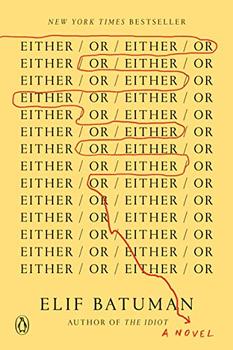Summary | Excerpt | Reviews | Beyond the Book | Readalikes | Genres & Themes | Author Bio

The First Week
It was dark when I got to Cambridge. I pulled my mother's suitcase over the cobblestones toward the river. Riley had been really mad when we were assigned to Mather, and not to one of the historic ivy-covered brick buildings where young men had lived in ancient times with their servants. But I wasn't into history, so I liked that the rooms in Mather were all singles, and nobody had to figure out how to share an irregularly sized suite where people had lived with their servants.
I hadn't spoken to Ivan since July, when we said goodbye in a parking lot on the Danube. We hadn't exchanged phone numbers, since we were both going to be traveling, and anyway we never had talked much on the phone. But I had never doubted that, when I got back to school, I would find an email from him, explaining everything. It was not, after all, conceivable that there was no explanation, or that the explanation could come from anyone else, or that it could come in any way other than email, since that was how everything had always happened between us.
Mather resembled an alien starship: impregnable, simultaneously ancient and futuristic, gathering its powers. I held my ID card in front of the reader, and the door to the computer room clicked open. I found myself remembering a book I'd read where a woman looked in a mirror for the first time after seven years in a gulag, and the face looking back wasn't her own, but that of her mother. I immediately recognized how shameful, self-important, and obtuse it was for me, an American college student who hadn't checked email for three months, to compare herself to a political prisoner who had spent seven years in a gulag. But it was too late-I had already thought of it.
I mistyped my password twice before I got it right. Information started cascading down the screen, first about the computer itself and the different protocols it was using, then about when and where it had last seen me, and finally the sentence that sent a jolt to my heart: You have new mail.
Ivan's name was there, just like I had known it would be. Before reading the message through, I looked at it all at once, to see how long it was and what it was like. Right away, I could tell something was wrong. So something is wrong, I read. I saw the words shocked and monster: I am very shocked that you see me as such a monster, it said. I know you won't believe anything I say. And: I hope you will tell me why I am so horrible, so that I can defend myself.
I had to reread the whole message twice before I understood that it was three months old. Ivan had sent it in June, in response to an angry email I had sent him before leaving campus. Technically, his reply had been invalidated by all the things that had happened between us in the intervening months. But it still felt like a new and final word from him, because, although there were several other messages in the in-box, none was from Ivan. He hadn't written anything to me at all since that day in the parking lot-since he had held me so close to him, and then gotten in his car and driven away.
Most of the other emails were also months old and out-of-date. There was one from Peter that said, I desperately need to know your flight arrival time in Budapest, and another from Riley asking if it was OK to apply to overflow housing so we wouldn't have to live in Mather. Only two messages were from the past couple of days. One said that I had to see my financial aid officer at the earliest opportunity. The other, from the new president of the Turkish Students Association, said that somebody had found a store in Brookline that sold Kayseri-style pastõrma: a kind of cured meat that some people said was etymologically related to pastrami. So if you like Kayseri-style pastõrma, you can go there, his message concluded.
I exited the email program and used the terrible "finger" command, to see where Ivan was. He had logged on from Berkeley two hours earlier. So he was there. He just wasn't writing to me.
.




Idealism increases in direct proportion to one's distance from the problem.
Click Here to find out who said this, as well as discovering other famous literary quotes!
Your guide toexceptional books
BookBrowse seeks out and recommends the best in contemporary fiction and nonfiction—books that not only engage and entertain but also deepen our understanding of ourselves and the world around us.